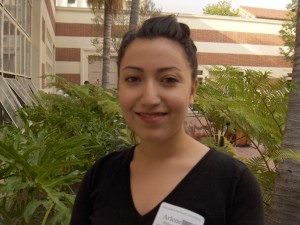Major and Classification
Theatre
Faculty Mentor
- David Roman, Ph.D.
Department
- English
McNair Project
Politics and Pride: Contemporary Latin Identity on the Los Angeles Stage
As the Latin@/Chican@ movement began to gain momentum in the late sixties and seventies, many Latin@ theatre groups began to emerge across the U.S. Among the politically-charged troupes, El Teatro Campesino, or Farmworker’s Theatre, was considered one of the most influential. Luis Valdez formed the group in 1965 in an effort to publicize and raise funds for the grape strike. He later became the first Chicano playwright to be presented on Broadway with his 1978 Zoot Suit, arguably one of the most important Latin@ plays of the 20th century. What began as semi-improvisational street theatre quickly became a success; the group began touring internationally, organizing marches, and appearing in publications frequently. Their efforts were fundamental in the struggle to acknowledge a Latin@ identity, and this new-found recognition stimulated activity among Latin@ artists, providing a cultural framework for future productions to come. The purpose of this study is to examine the role of gender and race in contemporary Los Angeles theatre, with an emphasis on Latin@ drama. My method of research will be by participant observation. By attending seven local and original productions, I will document relevant artistic choices and compare the plays textually and thematically. Of the seven productions, the four most significant to my study are as follows: Gaytino!, Taking Flight, Demeter in the City, and, Nowhere on the Border. They were selected under the following criteria: 1) All are contemporary–meaning they have been written recently or within the last few years. 2) All are racially-themed–meaning they have been written either by a person of color or are about a person of color. 3) All are performed in Los Angeles–for many reasons, including the large Latin@ population in L.A., and the historical significance the city has played during the formation of Latin@ theatre.
